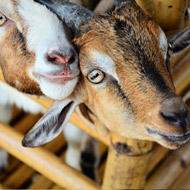Goats prefer happy faces, study finds

"Our results open new paths to understanding the emotional lives of all domestic animals.”
Goats are able to distinguish between happy and angry human faces, new research has suggested for the first time.
A study led by the Queen Mary University of London found that 20 goats preferred to look at and interact with photos of happy human faces.
This indicates that the ability to perceive human facial cues is not limited to those with a long history of domestication as companion animals, such as dogs and horses.
Goats at the Buttercup Sanctuary in Kent were shown grey-scale photos of the same, unfamiliar individual, showing both happy and angry facial expressions.
According to findings published in Royal Society Open Science, the images of happy faces elicited greater interaction. The goats looked at them, approached them and explored them with their snouts.
Scientists say this was particularly true when the happy faces were positioned on the right of the test arena, which suggests that goats use the left hemisphere of their brains to process positive emotions.
Co-author Natalia Albuquerque, from the University of Sao Paulo, said: “The study of emotion perception has already shown very complex abilities in dogs and horses.
“However, to date, there was no evidence that animals such as goats were capable of reading human facial expressions. Our results open new paths to understanding the emotional lives of all domestic animals.”
First author Dr Christian Nawroth added: “We already knew that goats are very attuned to human body language, but we did not know how they react to different human emotional expressions, such as anger and happiness.
“Here, we show for the first time that goats do not only distinguish between these expressions, but they also prefer to interact with happy ones.”



 The latest
The latest